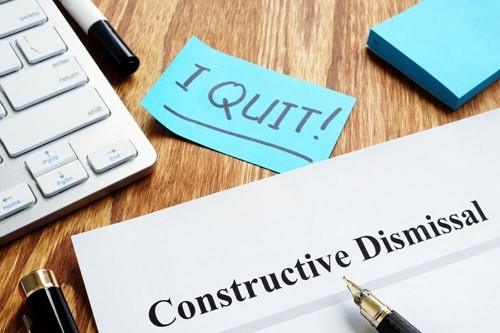In a previous article, we defined constructive dismissal and explained how to avoid it. In this article, we’ll provide examples of what constitutes a fundamental breach of contract and how the situation may develop.
So, if you’re still uncertain whether a situation constitutes constructive dismissal or not, read on…
If you need immediate advice on constructive dismissal or the end of an employment contract, speak to one of our advisors today on 01455 858 132.
What is constructive dismissal?
To recap, constructive dismissal is legal term that applies when a change to an employee’s working conditions or unfair treatment forces their resignation.
The difference between this and unfair dismissal, is that the you do not dismiss the employee. Instead, they leave the business after feeling forced out due to the employer’s conduct. Of course, claiming constructive dismissal is different. One employee might find a scenario tolerable, while another employee feels it’s impossible to cope.
However, a serious breach of contract could be automatically unfair. This means if you fail to provide something explicitly outlined in a staff member’s contract, their constructive dismissal claim is likely to be successful.
Should an employee work their notice period?
In most cases, the employee can resign with immediate notice. The breakdown in the employer-employee relationship is cause enough for them to forgo their notice.
Can anyone claim constructive dismissal?
Usually, an employee can only claim if they’ve been continuously employed for 2 years or more. However, there are some circumstances that might allow for a claim being raised despite length of service. For example, if the employee is having issues relating to a protected characteristic, they may be able to claim discrimination.
If the individual is a worker, or self-employed, they don’t have the right to raise a constructive dismissal claim.
Working hours and patterns don’t impact an individual’s right to make a claim. An individual who is set to work night shifts, for example, will still be able to claim so long as they’re an employee.
How much will I be forced to pay?
If an employment tribunal finds that your actions amounted to a fundamental breach of your employee’s contract, you’ll be liable to pay compensation for constructive dismissal.
The maximum payment an employee can receive depends on:
- How long they’ve worked for you
- How old they are when they’re dismissed
- Their weekly pay before tax and national insurance (NI) deductions
Depending on these factors, you could be forced to pay a sizeable sum through a basic and compensatory award. The employment tribunal (ET) has placed a cap on the basic award of £17,130. As for the compensatory award, there is a cap of £93,878. If you factor in both of these payments, plus legal fees and travel expenses, you could end up paying well over £110,000.
To avoid claims of constructive unfair dismissal, and the costs that come with them, familiarise yourself with some constructive dismissal examples…

Examples of constructive dismissal cases
There are a variety of instances that might lead an employee resigning from their position at your organisation. However, for the employee to make a claim after they resign, they’ll need to prove constructive dismissal was their only option. For example, they must prove that you:
- Refused to pay them or drastically cut their pay
- Demoted them for no reason
- Allowed harassment and bullying
- Didn’t provide a safe working environment
- Forced them to accept unreasonable changes to their roles, working conditions or hours
- Made false allegations against them
Let’s look at each of these constructive dismissal examples in further detail…
Refused pay or cut pay
One of an individual’s fundamental employment rights is to be paid for the work that they do by their employer. It is illegal for an employer to issue a contract without pay, or pay below the statutory minimum wage.
Failing to pay an employee correctly is a breach of contract and therefore grounds for constructive dismissal.
This doesn’t just apply to the employee’s salary or wage either—other contractual benefits could cause the same result. This includes benefits such as a company car, enhanced maternity pay, or sick pay.
If you fail to pay sick pay correctly, this also constitutes a fundamental breach of contract. The cases of Craig v Abellio & Mr Parbhjot Singh v Metroline West Limited are relevant to this issue. Keep reading for more detail on these cases.
Demotion
There are legitimate reasons for demotion in employment law. However, it is a contentious issue, and can very easily lead to constructive dismissal claims.
Firstly, you must have a legitimate reason for the demotion. You cannot demote an employee just because you don’t like them. You could demote an employee for performance issues, but you should have demonstrable evidence for this. You could also demote an employee as an alternative to dismissal.
Whether a demotion is legitimate will also come down to staff contracts. If there is a clause that allows demotions, you may be able to impose one as part of a company restructure. However, it is best practice to obtain the consent of the employee. If the demotion is for disciplinary reasons, it’s still advisable to get employee consent. If they’re hesitant to agree to the change, make it clear that the demotion is an alternative for dismissal. In this case, disagreement will likely result in termination of their contract.
For example, an employer has had frequent disagreements with their employee. As a result, head office decides the staff member is no longer capable of making important business decisions. They decide to demote them following an appraisal and their job description requires them to perform duties they’re unfamiliar with. The employer doesn’t obtain their consent regarding the role change. The employee resigns and raises a constructive dismissal claim.
Harassment and bullying
While bullying isn’t specified in the Equality Act 2010, harassment is when it related to a protected characteristic. It’s defined as any behaviour that makes some feel intimidated or offended.
When either of these occurs in the workplace, you should act immediately. If you fail to deal with it properly, you’re liable for harassment suffered by your employees.
For example, a member of staff informs you informally that their line manager regularly criticises and disregards their contributions. They purposefully ignore them in conversation and regularly makes comments about their religion.
You go through the process of addressing the issue first informally and then formally, but the employee still sees no improvement. If you take no action and the bullying continues, as a last resort the bullied employee may decide to resign. This would count as “the last straw” and they can claim constructive dismissal.
Safe working environment
Constructive dismissal doesn’t just relate to employment law. Health and safety breaches can also be a legitimate reason for an employee to leave the business.
There’s an implied term of trust and confidence between you and your staff. This means they trust you to create a safe environment while they’re at work. Additionally, case law demonstrates that an intolerable work environment can constitute a breach of this implied term.
So, for example, an employee who regularly uses display screen equipment (DSE) for more than an hour at a time complains about eye pain. Health & safety regulations require you to take the appropriate steps to reduce the risks associated with using this equipment.
If you don’t and they quit as a result of it. This could constitute a constructive dismissal.
Changes to an employment contract
This is the most common reason employees claim for constructive dismissal. These changes can happen at any time and for a variety of reasons. However, to fulfil your obligations as stated in your employee’s contract of employment, your employee must agree to all changes before implementation. This is part of your employee’s statutory rights when they work for you. Making any change without their consent is a breach of contract.
An example of this is if you change an employee’s working hours forcing them to work longer without a good business reason or first consulting and agreeing it with them.
In this scenario, if the employee doesn’t accept the change, they’d inform you of this in a resignation letter. They’ll agree to continue working but ‘under protest’ until you both come to a resolution. If you’re unable to come to an agreement and the employee ends up resigning because of this, that could be constructive dismissal.
False allegations
Under article six of the Human Rights Act 1998, everyone has the right to be presumed innocent until proven guilty. The same approach applies to the workplace. You should follow your internal policies and investigate all allegations properly and fairly and give the accused a chance to respond.
An example of a situation that can lead to claims of constructive dismissal is if an employer suspects an employee of theft from the company and accuses them of this without carrying out an investigation.
If they feel they’re being treated unfairly, the employee decides to resign as a result of this baseless allegation. They can then bring a claim against you for constructive dismissal.

Constructive dismissal and case law
It’s often in your interest to reach a settlement agreement through acas before a claim goes to tribunal. This option will help you avoid a costly and time-consuming tribunal process. If you want to early professional advice on this process, speak to one of our employment team today on 01455 858 132.
You should also familiarise yourself with some constructive dismissal case law examples to highlight all the circumstances in which employees claim for constructive dismissal.
Examples of employees taking legal action include:
Craig v Abellio
In this case, an employee had been off work due to sickness. His sick pay was calculated and paid incorrectly as a result of a series of errors and miscommunications by the employer. The employee raised a grievance and the employer was originally found to owe £2000 to the employee. Then, the employer was found to owe over £6000. The employer agreed to pay the employee by a specified date, but failed to pay by this deadline. The employee resigned the next day and brought a constructive dismissal claim.
The employment tribunal and employment appeal tribunal (EAT) went back and forth on whether the issue was a result of mistakes or a genuine repudiatory breach. Originally, it was found that the failure to pay was merely a mistake and not a breach of an express contractual term. However, the EAT eventually sent the case back to the ET for further consideration.
This case demonstrates how difficult it can be to determine whether the final straw in a constructive dismissal is enough to raise a successful claim.
Mr Parbhjot Singh v Metroline West Limited
Following an invitation to a disciplinary meeting, an employee went on sick leave. He attended an occupational health (OH) appointment to assess his capability. The OH advisor didn’t suggest that his sickness wasn’t genuine. However, the employer believed that the sickness absence was a means of avoiding his disciplinary meeting. As a result of this belief, the employer paid the employee statutory sick pay instead of contractual sick pay.
The employee claimed to have been constructively dismissed due to the failure to pay their contractual pay.
The ET found that the employer failing to pay contractual sick pay was a breach of contract, but also stated that it was not a repudiatory breach. This was because the employer intended to maintain the employment relationship and withholding the employee’s pay was a means of doing this. However, the EAT dismissed this line of reasoning, as the employee was entitled to pay which he didn’t receive.
Malik and Mahmud v. Bank of Credit; Mahmud v. Bank of Credit
This is a leading case that first confirmed the existence of an implied term of mutual trust and confidence in all employment contracts. Both claimants lost their jobs with the organisation after it went insolvent due to various fraudulent activities. They then tried to seek other employment elsewhere but to no avail. Eventually, they sued their previous employer for their loss of job prospect due to the reputational damage they suffered because of their association with the company. The case concluded with the House of Lords unanimously holding that contracts imply an unspoked term of mutual trust and confidence. They also went on to say that while the aim of the implied term is to protect employee relationships, if the employer’s breach causes “continuing financial losses” the employer can be held liable.
Adams v Charles Zub Associates Ltd
This case highlights the importance of maintaining clear communication channels. The employee, Adams quit his job and filed an unfair dismissal claim to an employment tribunal because he hadn’t received his April salary by the 9th of May.
Ordinarily, because this constitutes a significant breach going to the “root of the employment contract”, the ET would conclude that the employee was constructively dismissed.
However, in this case, the ET found that although a breach of contract occurred, it wasn’t the intention of the company to purposefully withhold the money, so it didn’t pass the test for constructive dismissal. This is because the employee was made aware of the organisation’s financial situation and the mitigating circumstances surrounding their pay.
Kaur v Leeds Teaching Hospitals NHS Trust
Employed as a nurse at Leeds Teaching Hospital Trust for six years, Kaur filed a tribunal claim for constructive dismissal. She claimed that from the onset of her employment with the hospital she’d received unjustified complaints about her performance. The above, along with other mitigating circumstances (maternity leave, an altercation with fellow co-workers, work-related stress, the organisation’s handling of her grievance, etc) led her to quit her job. She made a claim for constructive dismissal and identified the final straw as the outcome of an appeal she made following the organisation's disciplinary procedure. Although the tribunal agreed to a preliminary hearing to get the particularisation of the claim, they went on to dismiss it. The judge presiding on the case stated that her case for constructive dismissal would depend on whether or not the outcome of her appeal constitutes a ‘final straw’.
Western Excavating ECC V Sharp
In this example, an employee resigns from Western Excavating because of financial hardships in this personal life which he felt made his position untenable. The claimant approached his employers for an advance on his accrued holiday pay which they refused as it was against company policy to pay holiday pay unless it was actually taken. It then asked for a loan to which the company also declined because they couldn’t make him a loan to that extent. In order to receive his holiday pay, Mr Sharp decided to quit his job. After receiving it he went on to an industrial tribunal to claim for constructive unfair dismissal. In the tribunal, while the court found that the employers had fundamentally acted incorrectly, and Mr Sharp actually left of his own accord, he was still awarded compensation. They said the company ought to have leant over backwards to help their employee and because of the employer’s conduct, Mr Sharp received £659 in compensation.
However, the Court of Appeal later revered the Tribunal’s ruling. They held the Mr Sharp hadn’t been constructively dismissed, stating:
“If the employer is guilty of conduct which is a significant breach going to the root of the contract of employment, or which shows that the employer no longer intends to be bound by one or more of the essential terms of the contract, then the employee is entitled to treat himself as discharged from any further performance. If he does so, then he terminates the contract by reason of the employer’s conduct.”

Expert support
The examples provided in this article are meant to demonstrate the wide variety of situations that can lead to a claim of constructive dismissal. All employers can be the target of a claim if policies and procedures aren’t correctly followed.
Don’t assume that a case will go in your favour because a similar case went in the employer’s favour too. Each scenario is different and dependant on the facts.
If you’re facing a constructive dismissal claim, or just one to avoid one, contact us for more detailed support. We advise on all dismissal issues including constructive and unfair dismissal. Our legal team has the authorisation by the solicitors regulation authority to offer solicitor training contracts. That means our legal experts have invaluable knowledge offered by no other company.
Speak to one of them today for legal representation or employment law advice on 0808 145 3380.
Related resources
Categories
- Business Advice
- Contracts & Documentation
- Culture & Performance
- Disciplinary & Grievances
- Dismissals & Conduct
- Employee Conduct
- Employment Law
- End of Contract
- Equality & Discrimination
- Health & Safety
- Hiring & Managing
- Leave & Absence
- Managing Health & Safety
- Moving
- Occupational Health
- Pay & Benefits
- Recruitment
- Risk & Welfare





